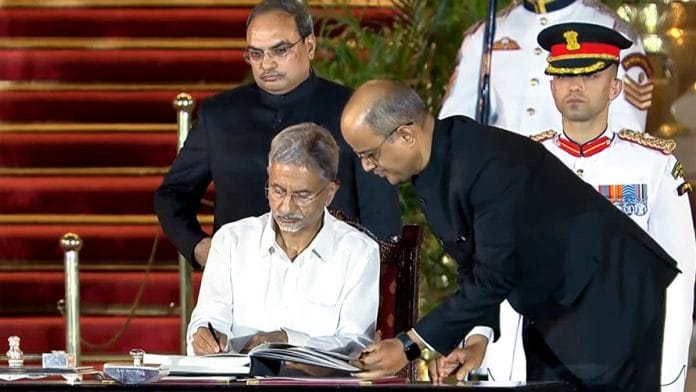New Delhi: Three months before the Lok Sabha elections, External Affairs Minister S. Jaishankar assured Europe of “continuity” and “stability” in India, adding that when democracy works, citizens “re-elect” governments. “In this country we know when democracy really works, we re-elect governments,” he said with a smile.
With the Modi cabinet sworn in for a third term Sunday, albeit without the BJP securing a majority of parliamentary seats, Jaishankar will hold the position of external affairs minister for another term.
Analysts believe the diplomat-turned-politician will face challenges in India’s neighbourhood amid a rising China while also pushing forth India’s agenda to be the “voice of the Global South”. Economic diplomacy will also be a key task as the Modi government seeks to achieve the $5 trillion economy target by 2025, they said.
“The presence of leaders from Maldives, Bangladesh, Bhutan and Sri Lanka at Modi’s swearing-in cannot be seen wholly as a show of strength from neighbouring countries,” said Amit Ranjan, Research Fellow, Institute of South Asian Studies, National University of Singapore (NUS). He explained that Jaishankar will be tasked with managing the relationship with these countries, where China is a key bilateral partner.
“Maldives is in economic dire straits and needs tourists from India, hence Muizzu’s presence. Ranil Wickremesinghe is yet to win an election and he is probably shoring up support ahead of this year’s Sri Lanka polls,” Ranjan added.
On Sunday, seven key heads of government from India’s neighbourhood attended the oath-taking ceremony of PM Modi and the Council of Ministers. These included Maldives President Mohamed Muizzu, who has shifted towards Beijing since winning the presidential elections in Maldives last November after running an ‘India-out’ campaign. Under Muizzu, Malé has demanded the removal of Indian military personnel from the archipelago island and also refused to renew an agreement that allows India to conduct hydrographic surveys in Maldivian waters.
Apart from Muizzu, Sri Lanka President Ranil Wickremesinghe, Bangladesh Prime Minister Sheikh Hasina, Nepal Prime Minister Pushpa Kamal Dahal ‘Prachanda’ and Bhutan Prime Minister Tshering Tobgay attended the event.
‘Raising issues of Global South on world stage’
Last year, as part of its G20 Presidency, India hosted two virtual ‘Voice of Global South’ summits to discuss challenges posed by global developments, at a time when the war in Ukraine and Gaza had ripple effects on the global economy and supply chains. Avoiding “debt traps”, a veiled reference to China, was discussed during the sessions. India also touted the inclusion of the African Union (AU) in the G20 during New Delhi’s presidency, as a win for the ‘Global South’.
Positioning India as the ‘voice of the Global South’ will continue to be a foreign policy priority as Jaishankar steers the Ministry of External Affairs. As reported by ThePrint, the Modi government has laid out a slew of ambitious 100-day and five-year plans, including holding a Global South Centre of Excellence Summit. Last November, Modi inaugurated DAKSHIN, a Global South Centre of Excellence, to promote dialogue and cooperation.
“There would be predictability in India’s foreign policy as India would continue to seek multipolarity without having alliances with anyone. At the same time, India would also seek global governance reform to make it more democratic and pro-Global South,” explained Raj Kumar Sharma, Senior Research Fellow at Delhi-based think tank NatStrat.
He added that economic diplomacy will also be key, predicting that the FTA with the UK — stuck in talks since 2022 — could be signed “within months”, while negotiations continue on with others like the EU, GCC and Israel.
Sharma also said that this year could see the resumption of India-Russia summits, which have been on ice for the last two years amid the Ukraine war. “Amidst the increasing Russia-China proximity, India would need to further strengthen its ties with Russia,” he added.
Kabir Taneja, Fellow at Observer Research Foundation (ORF), agrees that with two major conflicts on the world stage, Jaishankar’s “main job will be to pad India’s interests in a way that economic impact of geopolitical fault lines remains minimal”.
(Edited by Gitanjali Das)







one of the worst EA minster that India has ever had… lost the opportunity of supporting afghanisthan during their crisis time, but no, here bjp is busy in saffron politics